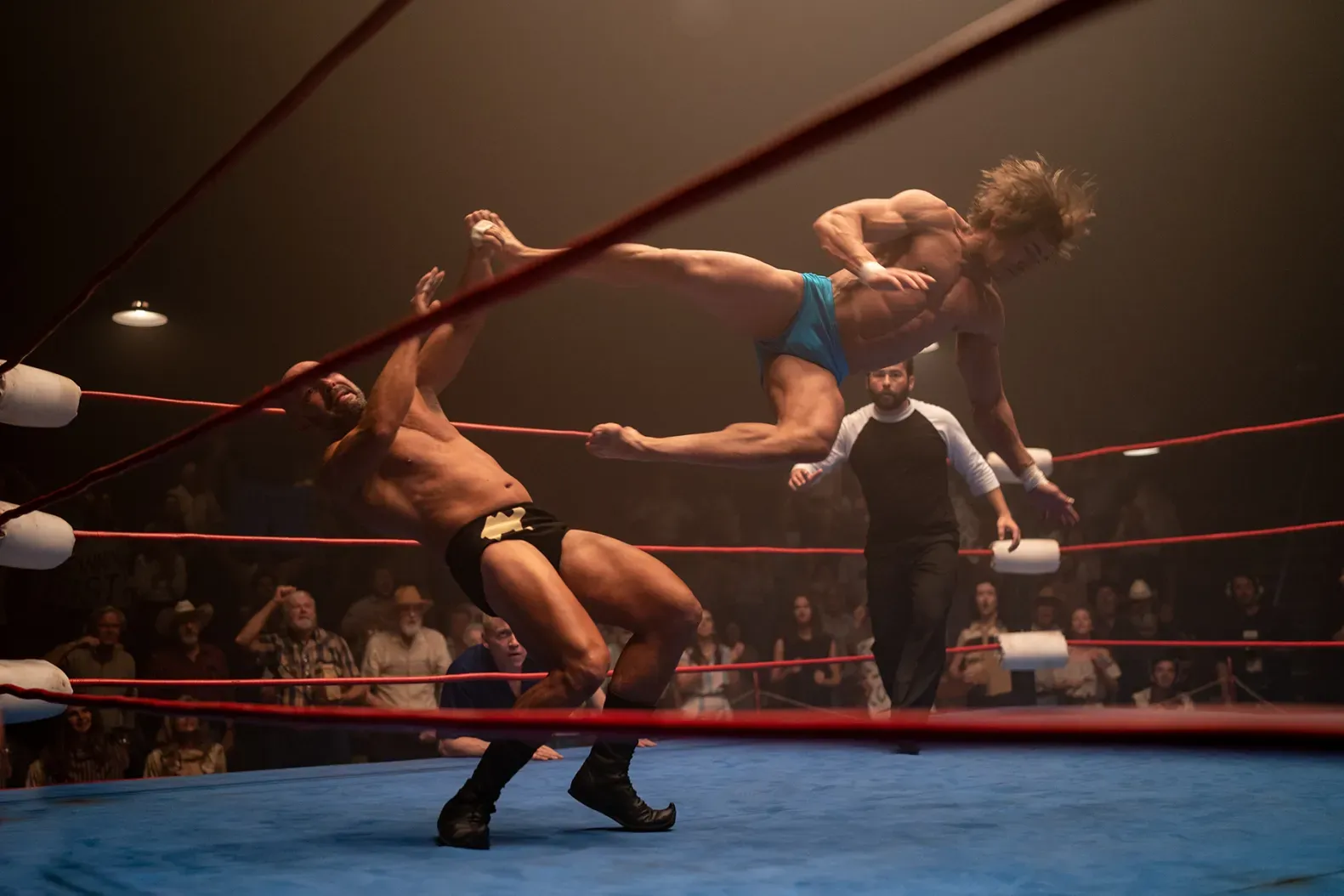
Deplorable Mythology
The Iron Claw is a Heartland epic. Of course it isn’t an Oscar contender.
The most important presence in The Iron Claw, director Sean Durkin’s requiem for professional wrestling, is not a barely recognizable Zac Efron pumped up to Arnold Schwarzenegger proportions; it’s Jimmy Carter as he appears on the famously cursed Von Erich family‘s cabinet TV midway through the movie, officially announcing America’s boycott of the 1980 Moscow Olympics.
Up to this point, we’ve heard a lot about Kerry (The Bear’s Jeremy Allen White), the Von Erich brother primed to finally bring world triumph to his clan as a discus thrower at the upcoming games. But Carter is having none of it. “The American people are convinced that we should not go,” says the man from Plains as patriarch Fritz Von Erich (Holt McCallany)’s eyes burn into the screen.
Nine months later, the American people overwhelmingly became convinced that it was Carter who should go. But, it was too late for the Von Erichs just as it was for so many Americans. These decisions of the few who know better than the rest of us keep the dream out of reach, a theme that makes Durkin’s masterful interrogation of sport and family one of the few Hollywood films since the 1970s interested in grappling with the type of people the shakers and movers would rather pretend don’t exist.
In a just world, Kerry would have been an Olympian, and The Iron Claw an Oscar frontrunner when the Academy announced its nominations on Tuesday. But the powers that be ignored it. Durkin’s refusal to make another poverty porn ode to Flyover Country damned his work in a cultural milieu where figures like Hillary Clinton cling to legitimacy by showing more concern for Barbie’s Oscar snubs than the fentanyl epidemic and dwindling opportunity for those she famously deemed the deplorables.
On paper, the movie has all the warning signs of a Hollywood only concerned with the Midwest and South when it can exploit the problems it has long exacerbated. Released by indie chic studio A24 fresh off the success of last year’s Oscar darling Everything Everywhere All at Once, it has the pedigree ripe for a depiction of Dallas’s darker corners as a circus freak show. Durkin is another NYU film school brat hoping to break into the auteur realm with his third feature, not exactly the regional storyteller primed to make a working-class magnum opus.
However, Durkin is also a filmmaker with an obsessively sociological eye dedicated to building dynamic worlds. His breakout film, Martha Marcy May Marlene, in which Elizabeth Olsen took a turn as an escapee from a cult in the Catskills proved that he could tell a sensationalist story while imbuing the rural with a quiet dignity. He cemented his knack for social commentary with The Nest, an intercontinental portrait of a dissolving marriage and the futility of social climbing starring Jude Law and Carrie Coon that towered over everything else released in 2020.
With The Iron Claw, Durkin melds his penchant for depicting America’s outskirts with his methodical portraits of the aspirational class. A lifelong wrestling fan, he displays a clear personal stake in the material, a love of the sport that led him to frequent used bookstores for VHS tapes of regional matches. “It was in this deep dive that I first saw The Von Erich brothers wrestling together as hometown heroes in the renowned Dallas Sportatorium,” Durkin wrote in a promotional piece for A24’s newsletter. “I’ll never forget those first images of that place. You could feel the sweat and the dust, you could smell the cigarette smoke. These guys were fast and exciting and the crowd was wild. Every wrestling show on TV was so polished at that point, verging on cartoonish. But this felt real and raw.”
Such a personal connection to the material allows him to expose the fissures in the cinema of Southern condescension. Durkin is an intelligent enough filmmaker to see that the Von Erich’s near ascension and sordid fall from grace was worthy of the Greek tragedy treatment. It was never the simplistic story of a failed dad living vicariously through his sons as the pressure he put on his progeny entered the realm of abuse early and never left as each succumbed to the death drives he instilled in them early on. It was a tale about the good life people like Fritz desperately clung to as those who attained it through the fandom of his class sneered. For Durkin, it’s also a tale of redemption through the embrace of personal responsibility and going one's own way, a rejoinder to those who sum up the pinnacle of American opportunity as the initiation into the clubs designed to keep the Von Erichs and their stock out.
Like Efron as he prepared for what should be the moment that finally establishes him as his generation’s greatest actor, the Von Erich boys define themselves through their power of transformation. They change their names. Their public personas. Their identities at the whims of their father. But Durkin’s film has confidence in its identity. It’s more interested in its own world than chasing accolades. It’s tired of Carter and his ilk speaking for all Americans from their entrenched bully pulpits. And that gives it the power to endure long after this awards season has run out of steam.
The Iron Claw is now playing in theaters.
